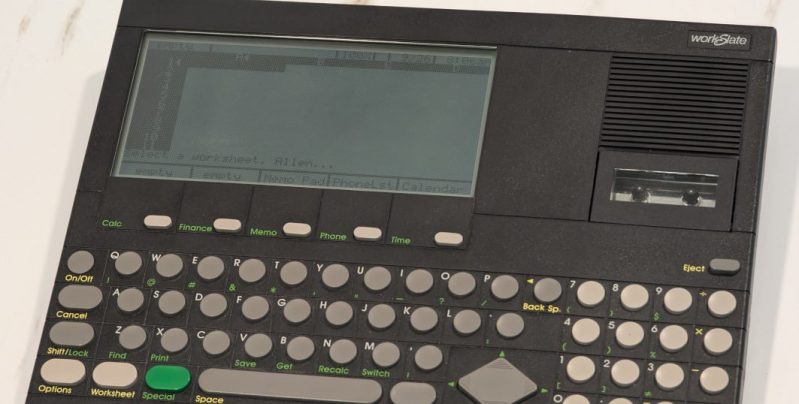Unlike the today’s consumer computer market, the 1980s were the wild west in comparison. There were all kinds of different, incompatible operating systems, hardware, and programs, all competing against one another, and with essentially no networking to tie everything together. Some of these products were incredibly niche as well, only running one program or having a limited use case to keep costs down. Such was the Convergent WorkSlate, a computer that ran only a spreadsheet with any programs also needing to be built into a spreadsheet.
Upon booting the device, the user is presented with a fairly recognizable blank spreadsheet, albeit with a now-dated LCD display (lacking a backlight) and a bespoke keyboard and cursor that wouldn’t have allowed for easy touch typing. The spreadsheet itself is quite usable though, complete with formatting tools and the capability to use formulas like a modern spreadsheet program would. It also hosted a tape deck for audio and data storage, a modem for communicating with other devices, and an optional plotter-style printer. The modem port is how [Old VCR] eventually interfaces with the machine, although as one can imagine is quite a task for a piece of small-batch technology from the 80s like this. After learning how to send and receive information, a small game is programmed into the machine and then a Gopher interface is built to give the device limited Internet connectivity.
The investigation that [Old VCR] goes into on this project to get this obsolete yet unique piece of hardware running and programmed to do other tasks is impressive, and worth taking a look at especially because spreadsheets like this aren’t Turing-complete, leading to a few interesting phenomenon that most of us wouldn’t come across in the modern computing world. Since only around 60,000 units were ever made it’s difficult to come across these machines, but if you want to take a look at the spreadsheet world of the 80s without original hardware you can still run Lotus 1-2-3 natively in Linux today.
Thanks to [Cameron] for the tip!
















Doing it with spreadsheets?
That reminds me of the weird old days where we used to build truly horrendous things in Excel…
I have some old character record sheets from 3.0 and 3.5 that were absolute monstrosities, and used to bring my gaming machine or workstation to it’s knees.
We are talking about 750Mb to 1.8Gb spreadsheets with the entire set of every player’s handbook and splatbook equipment, skill, feat, etc included and selectable with dropdowns.
Reboot your machine.
Open the file.
Go make a pot of coffee, because you aren’t doing anything else for 5-10 minutes, assuming it doesn’t crash or run out of memory.
I distinctly remember upgrading from 4Gb to 6Gb of ram in the early 2000s just to be able to run these things for our tabletop groups.
No you don’t.
You’re either senile, or making stuff up.
6gb ram in the early 2000s? yeah, No.
The Intel Pentium 4F “Prescott” x64 line came out in about 2005, but they were 32 bit address bus IIRC. Not sure, but I think the first real 64 bit address busses out of Intel were on ‘Core’ series (2006-ish). The Xeon line is a entirely different kettle of fish, and the socketed AMD CPUs are even worse. I distinctly remember having 4GB on a SMP desktop box I built in 2003, and 8GB on one I built in the fall of 2008.
Flash back to the days of VisiCalc….
Had a WorkSlate briefly in the early 90s — swapped somebody something for it. Worked fine for what it did, but that just wasn’t very much by 1990s expectations.
I love those 80 and 90ties electronic devices,unlike 60ties or 70ties where you need to eighter have degree or be serious nerd to get in your average Joe could get in it and start working. And its still not modern day monstrocities where even lightbulbs have so much electronics.
The more interesting technical stuff came earlier, but the eighties to mid-nineties was definitely the golden age for UI experimentation. And it’s really interesting to see the ideas that didn’t make it into the mainstream, because there’s a lot that probably deserves revisiting. (Apart from VR).
This reminds me of the Canon Cat, despite being completely different. You can picture a world where “general-purpose” personal computers never happened, and we just had word processors and spreadsheets and games and drawing tablets as separate /physical objects/, with their own UI paradigms.
I feel like the “computers as appliances” thing ended up happening with tablets and smartphones that are locked down and can only run approved apps.
Seem to remember seeing this or something similar in PC World around 83/84 and it was being sold in the UK through an American Express (or similar) catalog – but it was a long time ago.